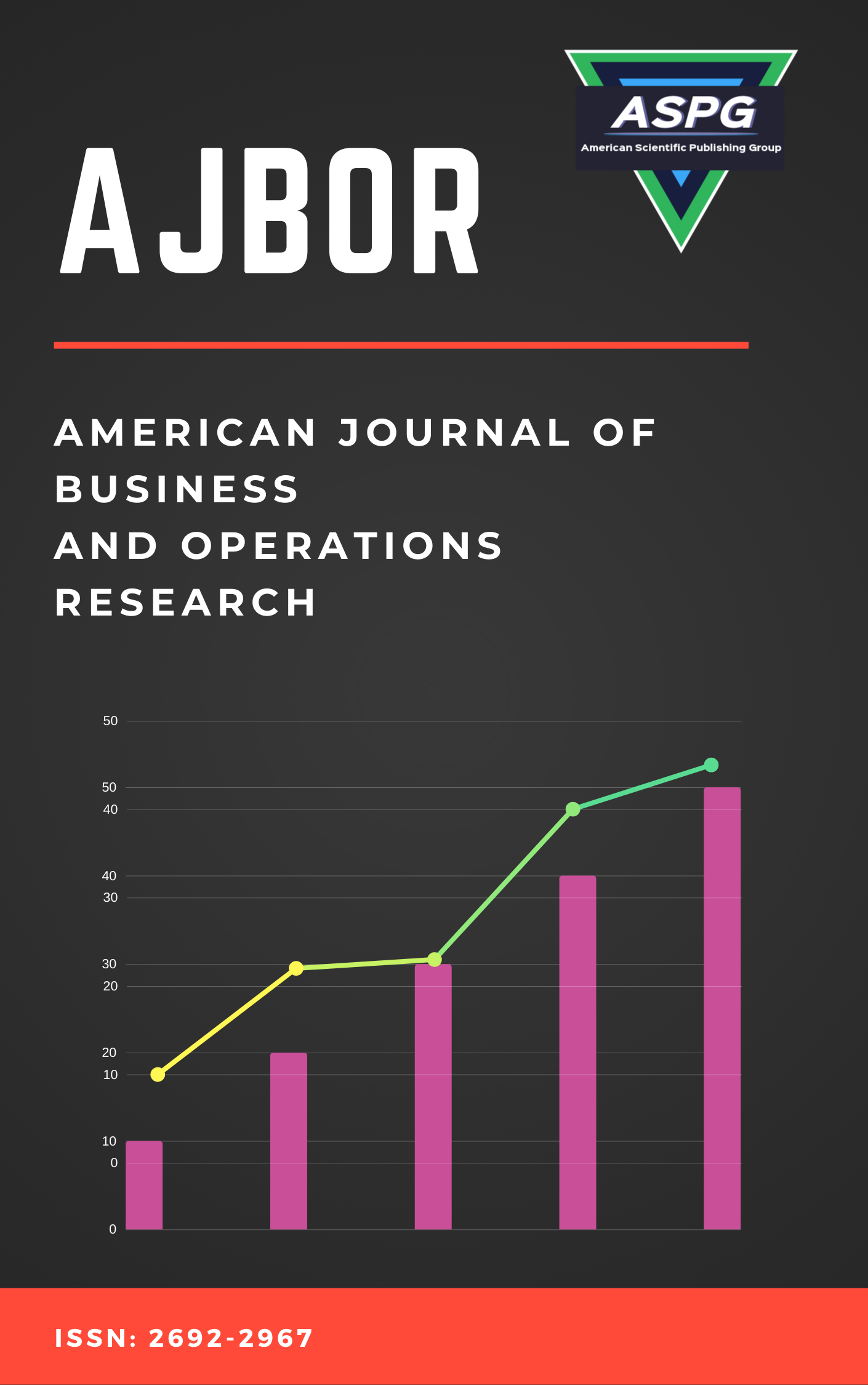

Volume 10 , Issue 1 , PP: 42-52, 2023 | Cite this article as | XML | Html | PDF | Full Length Article
Khyati Chaudhary 1 * , Gopal Chaudhary 2 , Manju Khari 3
Doi: https://doi.org/10.54216/AJBOR.100104
Supply chain networks are complex systems that involve multiple entities and activities, making them vulnerable to various risks that can negatively impact their performance. Game theory models have been used in various fields to analyze strategic interactions among agents and to make decisions in uncertain environments. This study investigates the application of game theory models for risk management in supply chain networks. Then, we present a framework for applying game theory models for risk management in supply chain networks. Our framework consists of three stages: risk identification, risk analysis, and risk mitigation. We validate the application of the proposed framework using a case study of a supply chain network for a fictional company. The results of the case study demonstrate that game theory models can provide valuable insights into the behavior of supply chain entities in different risk scenarios. The models can also help in identifying optimal strategies for mitigating risks and improving the performance of the supply chain network. The finding imply that the proposed framework can be used as a guide for practitioners to apply game theory models in their supply chain risk management practices.
Game Theory Models , Risk Management , Supply Chain Management.
[1] Papapanagiotou, K., & Vlachos, D. (2012). Managing supply chain disruption risks: a game-theoretical approach. International Journal of Mathematics in Operational Research, 4(5), 515-530.
[2] Qazi, A., Quigley, J., & Dickson, A. (2015, March). Supply Chain Risk Management: Systematic literature review and a conceptual framework for capturing interdependencies between risks. In 2015 International Conference on Industrial Engineering and Operations Management (IEOM) (pp. 1-13). IEEE.
[3] Khojasteh-Ghamari, Z., & Irohara, T. (2018). Supply chain risk management: A comprehensive review. Supply Chain Risk Management: Advanced Tools, Models, and Developments, 3-22.
[4] Nagurney, A., Nagurney, L. S., & Shukla, S. (2015). A supply chain game theory framework for cybersecurity investments under network vulnerability. Computation, cryptography, and network security, 381-398.
[5] Elleuch, H., Hachicha, W., & Chabchoub, H. (2014). A combined approach for supply chain risk management: description and application to a real hospital pharmaceutical case study. Journal of Risk Research, 17(5), 641-663.
[6] Wu, D. D., Chen, S. H., & Olson, D. L. (2014). Business intelligence in risk management: Some recent progresses. Information Sciences, 256, 1-7.
[7] Baryannis, G., Dani, S., Validi, S., & Antoniou, G. (2018). Decision support systems and artificial intelligence in supply chain risk management. In Revisiting supply chain risk (pp. 53-71). Cham: Springer International Publishing.
[8] Nagurney, A. (2021). Supply chain game theory network modeling under labor constraints: Applications to the Covid-19 pandemic. European journal of operational research, 293(3), 880-891.
[9] Praveena, S., & Devi, S. P. (2022). A survey on fuzzy based game theory approaches for supply chain uncertainties in E-Commerce applications. Materials Today: Proceedings, 62, 4862-4868.
[10] Bier, V. M., & Azaiez, M. N. (Eds.). (2008). Game theoretic risk analysis of security threats (Vol. 128). Springer Science & Business Media.
[11] Eissa, R., Eid, M. S., & Elbeltagi, E. (2021). Current applications of game theory in construction engineering and management research: a social network analysis approach. Journal of construction engineering and management, 147(7), 04021066.
[12] Nagarajan, M., & Sošić, G. (2008). Game-theoretic analysis of cooperation among supply chain agents: Review and extensions. European journal of operational research, 187(3), 719-745.
[13] Yin, S., Nishi, T., & Zhang, G. (2016). A game theoretic model for coordination of single manufacturer and multiple suppliers with quality variations under uncertain demands. International Journal of Systems Science: Operations & Logistics, 3(2), 79-91.
[14] Blecker, T., Kersten, W., Spath, H., & Koeppen, B. (2007). Supply chain risk management: A game theoretic analysis. In Supply chain management: Issues in the new era of collaboration and competition (pp. 355-387). IGI Global.
[15] Gao, J., Adjei-Arthur, B., Sifah, E. B., Xia, H., & Xia, Q. (2022). Supply chain equilibrium on a game theory-incentivized blockchain network. Journal of Industrial Information Integration, 26, 100288.
[16] Behzadi, G., O’Sullivan, M. J., Olsen, T. L., & Zhang, A. (2018). Agribusiness supply chain risk management: A review of quantitative decision models. Omega, 79, 21-42.
[17] Park, K., & Kyung, G. (2014). Optimizing supply chain finance model with destruction and disruption risks: application of the game theory and the PSO method. International Information Institute (Tokyo). Information, 17(7), 3009.
[18] Qazi, A. J., Quigley, J., & Dickson, A. (2014). Interdependency modeling of supply chain risks incorporating game theoretic risks.
[19] Vasnani, N. N., Chua, F. L. S., Ocampo, L. A., & Pacio, L. B. M. (2019). Game theory in supply chain management: Current trends and applications. International Journal of Applied Decision Sciences, 12(1), 56-97.
[20] Roy, S., Ellis, C., Shiva, S., Dasgupta, D., Shandilya, V., & Wu, Q. (2010, January). A survey of game theory as applied to network security. In 2010 43rd Hawaii International Conference on System Sciences (pp. 1-10). IEEE.
[21] Budler, M., & Trkman, P. (2017, June). The role of game theory in the development of business models in supply chains. In 2017 IEEE Technology & Engineering Management Conference (TEMSCON) (pp. 155-159). IEEE.
[22] Rajabzadeh, H., & Babazadeh, R. (2022). A game-theoretic approach for power pricing in a resilient supply chain considering a dual channel biorefining structure and the hybrid power plant. Renewable Energy, 198, 1082-1094.